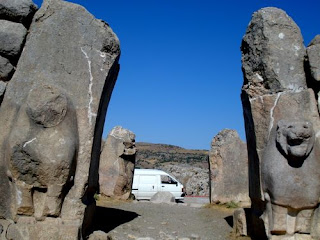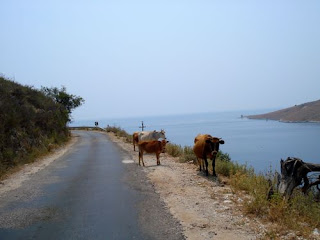After a rather depressing dinner the first evening we where walking home as the rain started to pour down. In a not very bright moment we decided to take shelter in one of the numerous “poker clubs”. We invested two euros in a pointless game of spinning fruits on a machine. As we were walking out, the owner (a scary guy with a four centimeter long, deep scar in his forehead and very Russian looks) stopped us. He pushed us into his small office and returned after five minutes with (no, not a weapon) a weird cake (rulltårta) and a bottle of vodka. With Peter’s stuttering Russian we toasted to love, brother nations and women. He soon went for another bottle and we were scared to refuse the never ending toasts. The night ended with instant coffee in another strange joint.
Two days later we drove to Kutaisi and, believe it or not, when we stopped at a gas station, the same guy, Georgy, showed up! After a few minutes we found ourselves in the same position as before, now joined by Georgy’s cousins, uncle and friends. They ordered a big feast in a private room of a restaurant (you could bring your own vodka and beer), again numerous toasts. This time the night ended less happy. After a visit to a dance palace, local dancing is very funny, the smallest of Georgy’s friends picked a fight with the band and all the guys joined. As we hid in our car the fight continued on the street until the police showed up. We now found out the probable reason of Georgy’s forehead scar. In Sweden police stop fights, here they simply beat up the participants. We returned to Georgy’s house (nowhere else to go in the middle of the night, we never had time to get a hotel) with the guys black and blue and bleeding from noses and knees.
From now on we avoid poker clubs.




Notice the bottles of champagne, vodka, wine, beer... on the table.







































